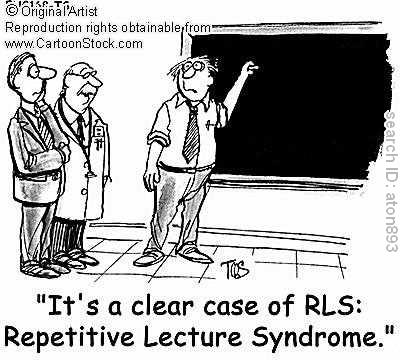 At a conference sponsored by the SEI Center for Advanced Studies in Management on “The Virtual University” (January 12, 1995), Martin Meyerson said:
At a conference sponsored by the SEI Center for Advanced Studies in Management on “The Virtual University” (January 12, 1995), Martin Meyerson said:
The best lectures have always been those that deal with “tentative materials” that result from the professor’s research. If they cease to be tentative, don’t include them in the lecture; print them. The main teaching function has to be interactive.
Imagine a university in which all teaching is based on “tentative materials” in this sense, and all the informational and conceptual fixities to be taught are available to students outside of class, any hour of the day or night.
According to Boswell, Sam Johnson said this:
Lectures were once useful; but now, when all can read, and books are so numerous, lectures are unnecessary. If your attention fails, and you miss a part of a lecture, it is lost; you cannot go back as you do upon a book … People have nowadays got a strange opinion that everything should be taught by lectures. Now, I cannot see that lectures can do as much good as reading the books from which the lectures are taken. I know nothing that can be best taught by lectures, except where experiments are to be shown. You may teach chymistry by lectures. You might teach making shoes by lectures!
Here again is a link to my sixty-second lecture on the end of the lecture (1999).
Thanks to Jack Lynch, here’s the bibliography on Sam Johnson’s remarks about the lecture. First, this from Boswell’s Life of Johnson, ed. G. B. Hill, rev. L. F. Powell, 6 vols. (Oxford: Clarendon Press, 1934-64), vol. 4, p. 92: “We talked of the difference between the mode of education at Oxford, and that in those Colleges where instruction is chiefly conveyed by lectures. JOHNSON. ‘Lectures were once useful; but not, when all can read, and books are so numerous, lectures are unnecessary. If your attention fails, and you miss part of the lecture, it is lost; you cannot go back as you do upon a book.’ Dr. Scott agreed with him. ‘But yet (said I) Dr. Scott, you yourself gave lectures at Oxford.’ He smiled. ‘You laughed (then said I) at those who came to you.’’ Then in the same book, volume 2, pages 7-8: “Talking of education, ‘People have now a-days, (said he,) got a strange opinion that every thing should be taught by lectures. Now, I cannot see that lectures can do so much good as reading the books from which the lectures are taken. I know nothing that can be best taught by lectures, except where experiments [p. 8] are to be shewn. You may teach chymistry by lectures. — You might teach making of shoes by lectures!’”
